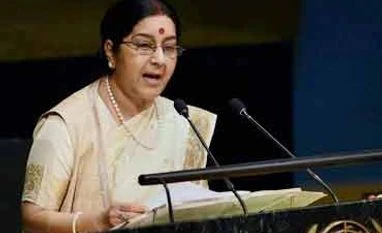Swaraj-Aziz talks: Focus on resuming composite dialogue
Swaraj will land in Islamabad on Tuesday to attend the fifth 'Heart of Asia' ministerial meeting
)
Sushma Swaraj
Pakistan Prime Minister's Advisor on Foreign Affairs Sartaj Aziz said on Monday in Islamabad his talks with Indian foreign minister Sushma Swaraj would focus on exploring the possibility of resuming the composite dialogue process between the two neighbours. Swaraj and Aziz are slated to meet on the sidelines of a multilateral conference on Afghanistan in Islamabad on Tuesday and Wednesday.
Swaraj will land in Islamabad on Tuesday to attend the fifth 'Heart of Asia' ministerial meeting. She will also visit Pak PM Nawaz Sharif. New Delhi confirmed the visit on Monday morning, barely 24 hours after talks between the national security advisors of India and Pakistan on Sunday in Bangkok.
In the Rajya Sabha, Congress member Rajeev Shukla, the Indian Premier League commissioner, demanded to know why the government wasn't giving its nod for the India-Pakistan cricket series in Sri Lanka when the two PMs and NSAs have met. Congress deputy leader in the Rajya Sabha Anand Sharma accused the government of making a "fundamental departure" in New Delhi's position on Indo-Pak ties and of "disrespecting" Parliament by not keeping it informed. The government promised that Swaraj would make a statement on the issue on December 10.
The two NSAs, India's Ajit Kumar Doval and Naseer Janjua of Pakistan, discussed terrorism, Jammu & Kashmir and a range of key bilateral issues apart from agreeing to carry forward the 'constructive' engagement. The NSA-level discussions took place after Prime Minister Narendra Modi and his Pakistani counterpart Sharif met on the sidelines of the climate change talks in Paris earlier this month.
Aziz said the deadlock in Indo-Pak ties had eased to some extent. The 'composite dialogue' process, which achieved a significant success, was severed in the wake of the 26/11 Mumbai terror attacks in November 2008. S M Krishna was the last Indian foreign minister to visit Pakistan in 2012. Foreign secretary S Jaishankar, who was also present in Bangkok, would accompany Swaraj.
Also Read
Beijing on Monday 'commended' the meeting of India-Pakistan NSAs. "As a friend and neighbour to India and Pakistan, China is pleased to see the momentum of the improvement and we commend their efforts," Chinese foreign ministry spokesperson Hua Chunying told reporters at a media briefing in Beijing. "We sincerely hope they can continue with the improvement and jointly contribute to the regional stability and development."
The latest developments indicate a softening of the Modi government's Pakistan policy. Modi and Sharif had met on the sidelines of the Shanghai Cooperation Organization at Ufa, Russia in July where the joint statement had missed a mention of Kashmir, but proposed the two NSAs would meet to discuss all "terror-related" issues. Pakistan had called off Aziz's visit after New Delhi refused to give him permission to meet Kashmiri separatist leaders in the Indian capital. The joint statement after Doval-Janjua meeting in Bangkok mentions terror as well as Kashmir.
Jammu & Kashmir chief minister Mufti Mohmmad Sayeed called the NSA-level talks a "good beginning". Former Jammu & Kashmir chief minister Omar Abdullah asked the Bharatiya Janata Party if India was "made to talk Kashmir" during the NSA-level meeting. "If Pakistan was made to talk terror (in Ufa), was India also made to talk Kashmir since J&K had found no mention in Ufa?" Omar wrote on Twitter.
More From This Section
Don't miss the most important news and views of the day. Get them on our Telegram channel
First Published: Dec 08 2015 | 12:04 AM IST
